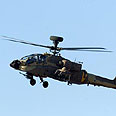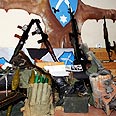

Israel Air Force air strikes Sunday afternoon took out two rocket launchers in Tyre, in southern Lebanon, and two vehicles used by Hizbullah operatives. The strike took place shortly after a fatal rocket barrage in Haifa claimed the lives of two city residents.
The IAF's operations in Lebanon are twofold: destruction of terrorist infrastructure and 'rocket hunting' – combing Lebanon for rocket launch sites and launch cells and taking them out in real time.
Since Sunday morning, the IAF struck almost 50 rocket launch sites in Lebanon, as well as a weapons cache containing an assortment of armaments. After a round of nocturnal sorties early Sunday morning, the IAF again hit Hizbullah's al-Manar TV station in Beirut, as well as headquarters and other of the organization's structures in Baalbek.
"We're in Lebanese skies 24/7," a senior IAF official told ynet, "We have already hit important infrastructure and are continuing to attack important targets. Simultaneously, any rocket launcher or instrument suspected of being a rocket launcher - including those hidden in fields or crowded areas – are destroyed upon immediately upon discovery."
'We'll push cells north'
According to the officer, "the terrorists continue to operate from population centers and use tunnels in order to hide. I am convinced that if we continue with our current policy and keep destroying their launching capabilities, we will push the cells north and, consequently, hurt their precision."
The IAF is also preparing to serve as aerial backup for IDF ground forces who will be operating in southern Lebanon villages. Any entrance, like the one in Maroun al-Ras, will be accompanied by IAF aircrafts in order to reduce the risk of harm to troops on the ground.
Simultaneously, the IDF is responding to international appeals to provide humanitarian aid in Lebanon to citizens not participating in terror activities.
In order to protect these citizens, the IDF will help coordinate the transfer of such aid, in conjunction with international organizations that are consolidating humanitarian supplies. Supplies and representatives will arrive by ship to the port of Beirut. From there, the supplies will be transferred across Lebanon.















